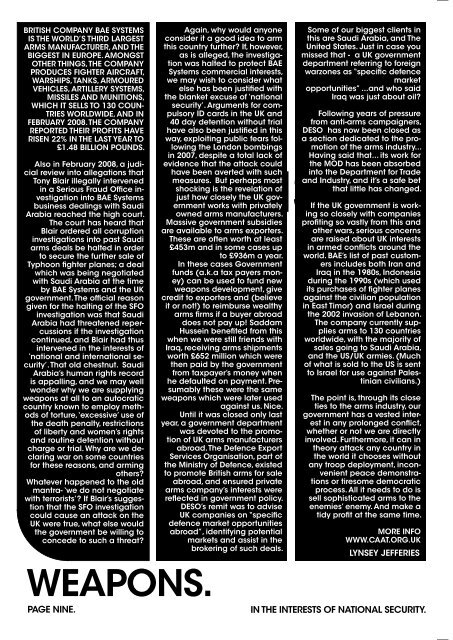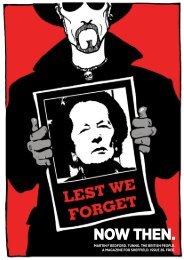You also want an ePaper? Increase the reach of your titles
YUMPU automatically turns print PDFs into web optimized ePapers that Google loves.
NOW THEN welcomes all feedback on all <strong>of</strong> our articles, get online at NOWTHENSHEffIELd.COM and join in on the forum.<br />
BRITISH COMPANY BAE SYSTEMS<br />
IS THE WORLD’S THIRD LARGEST<br />
ARMS MANUFACTURER, AND THE<br />
BIGGEST IN EUROPE. AMONGST<br />
OTHER THINGS, THE COMPANY<br />
PRODUCES FIGHTER AIRCRAFT,<br />
WARSHIPS, TANKS, ARMOURED<br />
vEHICLES, ARTILLERY SYSTEMS,<br />
MISSILES AND MUNITIONS,<br />
WHICH IT SELLS TO 130 COUN-<br />
TRIES WORLDWIDE, AND IN<br />
FEBRUARY 2008. THE COMPANY<br />
REPORTED THEIR PROFITS HAvE<br />
RISEN 22% IN THE LAST YEAR TO<br />
£1.48 BILLION POUNDS.<br />
Also in February 2008, a judicial<br />
review into allegations that<br />
Tony Blair illegally intervened<br />
in a Serious Fraud Office investigation<br />
into BAE Systems<br />
business dealings with Saudi<br />
Arabia reached the high court.<br />
The court has heard that<br />
Blair ordered all corruption<br />
investigations into past Saudi<br />
arms deals be halted in order<br />
to secure the further sale <strong>of</strong><br />
Typhoon fighter planes; a deal<br />
which was being negotiated<br />
with Saudi Arabia at the time<br />
by BAE Systems and the UK<br />
government. The <strong>of</strong>ficial reason<br />
given for the halting <strong>of</strong> the SFO<br />
investigation was that Saudi<br />
Arabia had threatened repercussions<br />
if the investigation<br />
continued, and Blair had thus<br />
intervened in the interests <strong>of</strong><br />
‘national and international security’.<br />
That old chestnut. Saudi<br />
Arabia’s human rights record<br />
is appalling, and we may well<br />
wonder why we are supplying<br />
weapons at all to an autocratic<br />
country known to employ methods<br />
<strong>of</strong> torture, ‘excessive’ use <strong>of</strong><br />
the death penalty, restrictions<br />
<strong>of</strong> liberty and women’s rights<br />
and routine detention without<br />
charge or trial. Why are we declaring<br />
war on some countries<br />
for these reasons, and arming<br />
others?<br />
Whatever happened to the old<br />
mantra- ‘we do not negotiate<br />
with terrorists’? If Blair’s suggestion<br />
that the SFO investigation<br />
could cause an attack on the<br />
UK were true, what else would<br />
the government be willing to<br />
concede to such a threat?<br />
Again, why would anyone<br />
consider it a good idea to arm<br />
this country further? If, however,<br />
as is alleged, the investigation<br />
was halted to protect BAE<br />
Systems commercial interests,<br />
we may wish to consider what<br />
else has been justified with<br />
the blanket excuse <strong>of</strong> ‘national<br />
security’. Arguments for compulsory<br />
ID cards in the UK and<br />
40 day detention without trial<br />
have also been justified in this<br />
way, exploiting public fears following<br />
the London bombings<br />
in 2007, despite a total lack <strong>of</strong><br />
evidence that the attack could<br />
have been averted with such<br />
measures. But perhaps most<br />
shocking is the revelation <strong>of</strong><br />
just how closely the UK government<br />
works with privately<br />
owned arms manufacturers.<br />
Some <strong>of</strong> our biggest clients in<br />
this are Saudi Arabia, and The<br />
United States. Just in case you<br />
missed that - a UK government<br />
department referring to foreign<br />
warzones as “specific defence<br />
market<br />
opportunities” ...and who said<br />
Iraq was just about oil?<br />
Following years <strong>of</strong> pressure<br />
from anti-arms campaigners,<br />
DESO has now been closed as<br />
a section dedicated to the promotion<br />
<strong>of</strong> the arms industry...<br />
Having said that... its work for<br />
the MOD has been absorbed<br />
into the Department for Trade<br />
and Industry, and it’s a safe bet<br />
that little has changed.<br />
Massive government subsidies<br />
are available to arms exporters.<br />
These are <strong>of</strong>ten worth at least<br />
£453m and in some cases up<br />
to £936m a year.<br />
In these cases Government<br />
funds (a.k.a tax payers money)<br />
can be used to fund new<br />
weapons development, give<br />
credit to exporters and (believe<br />
it or not!) to reimburse wealthy<br />
arms firms if a buyer abroad<br />
does not pay up! Saddam<br />
Hussein benefited from this<br />
when we were still friends with<br />
Iraq, receiving arms shipments<br />
worth £652 million which were<br />
then paid by the government<br />
from taxpayer’s money when<br />
he defaulted on payment. Presumably<br />
these were the same<br />
weapons which were later used<br />
against us. Nice.<br />
Until it was closed only last<br />
year, a government department<br />
was devoted to the promotion<br />
<strong>of</strong> UK arms manufacturers<br />
abroad. The Defence Export<br />
Services Organisation, part <strong>of</strong><br />
the Ministry <strong>of</strong> Defence, existed<br />
to promote British arms for sale<br />
abroad, and ensured private<br />
arms company’s interests were<br />
reflected in government policy.<br />
DESO’s remit was to advise<br />
UK companies on “specific<br />
defence market opportunities<br />
abroad”, identifying potential<br />
markets and assist in the<br />
brokering <strong>of</strong> such deals.<br />
LYNSIf the UK government is working<br />
so closely with companies<br />
pr<strong>of</strong>iting so vastly from this and<br />
other wars, serious concerns<br />
are raised about UK interests<br />
in armed conflicts around the<br />
world. BAE’s list <strong>of</strong> past customers<br />
includes both Iran and<br />
Iraq in the 1980s, Indonesia<br />
during the 1990s (which used<br />
its purchases <strong>of</strong> fighter planes<br />
against the civilian population<br />
in East Timor) and Israel during<br />
the 2002 invasion <strong>of</strong> Lebanon.<br />
The company currently supplies<br />
arms to 130 countries<br />
worldwide, with the majority <strong>of</strong><br />
sales going to Saudi Arabia,<br />
and the US/UK armies. (Much<br />
<strong>of</strong> what is sold to the US is sent<br />
to Israel for use against Palestinian<br />
civilians.)<br />
The point is, through its close<br />
ties to the arms industry, our<br />
government has a vested interest<br />
in any prolonged conflict,<br />
whether or not we are directly<br />
involved. Furthermore, it can in<br />
theory attack any country in<br />
the world it chooses without<br />
any troop deployment, inconvenient<br />
peace demonstrations<br />
or tiresome democratic<br />
process. All it needs to do is<br />
sell sophisticated arms to the<br />
enemies’ enemy. And make a<br />
tidy pr<strong>of</strong>it at the same time.<br />
MORE INFO<br />
WWW.CAAT.ORG.UK<br />
LYNSEY JEFFERIES<br />
Sheffield has 11 rough sleepers<br />
according to the latest government<br />
statistics which state that<br />
45 people are sleeping rough<br />
in London and 498 in England.<br />
The <strong>of</strong>ficial data which also<br />
states there is only one rough<br />
sleeper in Leeds, contradicts<br />
the growing demand for homeless<br />
services, shelters and soup<br />
kitchens across the country.<br />
Sheffield is no exception.<br />
The Salvation Army hostel on<br />
Charter Row in the city centre<br />
turned away 3,000 people last<br />
year because its 56 beds were<br />
full every night.<br />
Steven Burnell, Centre Manager<br />
at The Salvation Army hostel<br />
said: “The government underestimates<br />
rough sleepers. They<br />
only count people actually<br />
sleeping within the city centre.<br />
It doesn’t matter if someone<br />
is walking round looking terrible<br />
carrying a blanket - they<br />
don’t count. We did a survey in<br />
the city centre and could put<br />
names to over 50 people.”<br />
There has been a 73% decrease<br />
over the last decade<br />
in the number <strong>of</strong> rough sleepers<br />
across Britain according<br />
to government figures. Jenny<br />
Edwards, Chief Executive <strong>of</strong><br />
Homeless Link said: “Our country<br />
has inspired the rest <strong>of</strong> the<br />
world in the way it has tackled<br />
rough sleeping, with the government,<br />
the voluntary sector<br />
and local authorities working<br />
together.”<br />
The government’s method <strong>of</strong><br />
counting rough sleepers has<br />
been criticised by homeless<br />
charities such as Crisis. Local<br />
authority street counts do not<br />
include people living in hostels,<br />
squats, bed and breakfasts or<br />
staying with friends and family.<br />
Once a person becomes<br />
homeless it is difficult for them<br />
to change their situation without<br />
help.<br />
One Big <strong>Issue</strong> vendor said:<br />
“When you’re not living anywhere<br />
you can’t get a bank account,<br />
you can’t get a job - you<br />
need a job to support yourself<br />
and to get a house. You’re in a<br />
vicious circle, and it’s hard to<br />
get out <strong>of</strong>. People start taking<br />
drugs or drink a lot because<br />
they are depressed. You just dig<br />
yourself into a bigger hole all<br />
the time. In the end you just realise<br />
how far you’ve come from<br />
normality.”<br />
Many homeless people turn to<br />
the council for help in finding<br />
them a home. Sheffield City<br />
Council provides housing to<br />
49,000 people every year. The<br />
homeless must undergo an assessment<br />
with Housing Officers<br />
to establish whether they are<br />
eligible for council housing.<br />
They are then given a priority<br />
level.<br />
Kaye, 21, from High Green has<br />
been homeless for seven years.<br />
She now pays £25 a week to<br />
live at a Salvation Army hostel.<br />
She is furious at what she sees<br />
as the council’s failure to invest<br />
in housing for the homeless.<br />
She said: “To me it seems like<br />
they’re not bothered at all. I<br />
was on the streets at 14 yearsold,<br />
I applied and they told<br />
me that I wasn’t priority and I<br />
wasn’t vulnerable.”<br />
The Council sometimes place<br />
applicants who are waiting to<br />
be housed in temporary accommodation.<br />
But in some<br />
cases applicants have to find<br />
accommodation and pay for it<br />
themselves.<br />
Mark has been homeless for<br />
over two years. He is not high<br />
priority for council housing<br />
and is currently living in a bed<br />
and breakfast costing £16.50 a<br />
night. He sells the Big <strong>Issue</strong> and<br />
has to make enough money<br />
each day to pay for his room.<br />
He said: “The trouble with being<br />
on the streets is that everybody<br />
else thinks you’re someone<br />
else’s problem. Basically<br />
every door you knock on gets<br />
banged back in your face.”<br />
Sheffield has a number <strong>of</strong><br />
initiatives run by the government,<br />
the Council and charities<br />
to help the homeless, but the<br />
resounding opinion from staff<br />
working at the Archer Project<br />
and the Salvation Army is that<br />
much more is needed.<br />
The Cathedral Archer Project<br />
(CAP) is a charity run by volunteers.<br />
It <strong>of</strong>fers free breakfasts<br />
and 50p lunches to the homeless.<br />
The charity costs £225,000<br />
a year to run and provides<br />
showers, vital health services<br />
and education projects. It also<br />
houses the Big <strong>Issue</strong>, an international<br />
entity that works with<br />
homeless people across the<br />
world.<br />
The Big <strong>Issue</strong> magazine is sold<br />
by the homeless who buy the<br />
magazines for 70p and sell<br />
them on the streets for £1.50.<br />
The Big <strong>Issue</strong>’s philosophy is to<br />
‘give people a hand-up not a<br />
hand-out’ and to help people<br />
help themselves.<br />
Kaye has been selling the big<br />
issue for three years. She said:<br />
“I got a drug habit, got kicked<br />
out <strong>of</strong> home, did even more<br />
drugs, got into crime and got<br />
into working the beat and just<br />
screwed my life up completely.<br />
I started coming to Archer<br />
Project, got in with Big <strong>Issue</strong>,<br />
started selling them and slowly<br />
getting my life back together.”<br />
How you can help:<br />
Buy The Big <strong>Issue</strong>!<br />
If you would like to volunteer to<br />
be part <strong>of</strong> CAP or help out at<br />
a soup kitchen, call 0114 263<br />
6974.<br />
Some people’s names have<br />
been changed to protect their<br />
anonymity.<br />
JESSICA BELL<br />
PAUL HIRST<br />
WEAPONS.<br />
PAGE NINE.<br />
IN THE INTERESTS OF NATIONAL SECURITY.<br />
ROUGH SLEEPERS.<br />
YOU SEE THEM, WE SEE THEM, COUNCIL SEEMS NOT TO.<br />
PAGE EIGHT.












